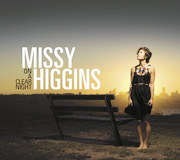Clearly Out
Aussie singer/songwriter Missy Higgins releases her sophomore CD, ‘On a Clear Night.’

Missy Higgins is definitely on the rise. The 2005 debut disc, The Sound of White, earned the out lesbian singer/songwriter a devoted following. The exceptional follow-up, On a Clear Night (Reprise), has the potential to keep the momentum rolling in her favor. Songs such as “Where I Stood,” “Steer,” “Warm Whispers,” and “Peachy” display both her versatility and her knack for writing memorable tunes. My interview with the in-demand Australian was pushed back a couple of times during the course of an afternoon, indicating that I wasn’t the only journalist eager to speak with her. As Higgins said at the beginning of our interview, “It’s really good that things are starting to pick up for me over here. I know that if people want interviews, it’s obviously a good thing.”
Higgins is currently performing on a U.S. tour, which will take her to Austin this fall. On September 5, she will perform at La Zona Rosa. More info: www.missyhiggins.com.
Gregg Shapiro: A couple of years have passed between the release of your debut album, The Sound of White, and On a Clear Night. How would you say that you have changed personally during that time, if at all?
Missy Higgins: I think that, as a person, I’ve definitely grown up, to say the least. [Laughs] When I wrote some of the songs for the first album, I started writing when I was 15, basically. I’m 24 now, so a lot of time has passed. The issues that I’ve touched on for this album come from, I’d have to say, a more mature and maybe self-assured place.
How would you say that you changed as a musician during that time?
I’m not sure how much I’ve changed as a musician. I’ve definitely been leaning much more toward the guitar these days than the piano, just because the guitar is a much more portable instrument than the piano. A lot of this album was written on the guitar, because I can take it into hotel rooms and on the tour bus and that kind of thing.
I’m glad that you mentioned that because you continue to play piano and guitar on On a Clear Night. Do you prefer one instrument over the other when you are writing songs?
In the beginning, I was essentially a piano player because I started playing piano when I was about six. I didn’t pick up the guitar until I was 13 or 14. I was much stronger at piano than I was at guitar because I’d been playing it a lot longer. But then my lifestyle made it much easier to play guitar, so I went more toward that. I actually quit piano when I was 14 because I decided that it wasn’t cool enough. My parents had wanted me to play it for so long and tried to make me practice, and it just felt a little bit forced and like it was a chore. Guitar was much cooler, and I was starting to get into the grunge bands like Nirvana and Hole and all that kind of stuff, so I got an electric guitar.
You’ve had an amazing amount of success in Australia. Are you able to walk down the street without being recognized, or is that a thing of the past?
I usually get recognized, but it’s not a massive thing in Australia to be famous. It’s definitely not like being a celebrity in America. It’s much more small time, in other words. [ Laughs ] I don’t get mobbed or anything. Nobody really cares.
What would it mean to you to be mobbed in the States?
That would mean that I’d either made some really bad choices and become famous without being successful or that I’d become really successful. Because, in the States, to be that famous and to be at the level where you’re being mobbed on the streets means that you have to be selling an incredible amount of records, just because your country is so huge.
 The songs on On A Clear Night retain the essence of what made The Sound of White so wonderful, prominently displaying your distinctive singing and songwriting and musicianship. But there are some noticeable differences, including the presence of producer/musician Mitchell Froom and Neil Finn of Split Enz and Crowded House fame. How did you come to work with both of them?
The songs on On A Clear Night retain the essence of what made The Sound of White so wonderful, prominently displaying your distinctive singing and songwriting and musicianship. But there are some noticeable differences, including the presence of producer/musician Mitchell Froom and Neil Finn of Split Enz and Crowded House fame. How did you come to work with both of them?
I’d done a support tour of The Finn Brothers in Australia, and I’d met Neil Finn a couple of times. That’s how I knew him, and obviously I was a huge fan. So I knew of him before I’d actually met him.
Mitchell Froom—when I was looking around for producers, I had been listening to a lot of albums. The ones that stood out were the ones that Mitchell had produced. I met up with him in L.A., and with a few other people. With Mitchell, I just got along with him really well, and we seemed to have a lot of the same ideas as to what the album should sound like. He put forward his ideas, and I put forward mine, and they were definitely along the same lines that the album should just be very simply recorded. And the musicians that he wanted to work with—one of them was Matt Chamberlain on the drums, who I was a big fan of. And I thought, wow! [Laughs] I hadn’t heard of any of the other musicians, but I thought, if he wants to work with Matt Chamberlain, then I will trust every single other decision he makes in the musician department.
Wise decision. The song “100 Round the Bends” opens with the line “I follow complications like a bloodhound.” Is that just a great opening line or a spot-on description of who you are?
It definitely doesn’t sum up who I am, but I’ve been known to go through phases of chasing the hard route instead of going the easy way. I guess, essentially, that I’m an artist at heart. So I enjoy a bit of a struggle. And when I’m down, I tend to kind of roll around in it rather than try to claw my way out. And my favorite thing to do is explore the darkest parts of my mind and go in there and embrace it and see where it can take me. Lots of time it can take me to the guitar or my piano, and that gives me literally an instrument to let go of something that’s been troubling me.
Speaking of piano, the song “Secret” made me think of Fiona Apple, who is also known for her piano playing. Is she someone that you would consider to be an influence on your work?
Yeah, she definitely is an influence on me. When I was writing for my first album, I had a lot of people say to me that I sounded a bit like Fiona Apple, but I’d never heard of her at the time. Because so many people said that I sounded like her, I thought, I’m gonna check this girl out, because maybe we’re quite similar and maybe she could be an influence on me. [Laughs] I listened to her music, and I just loved it. Sarah McLachlan was another big influence on me when I was starting out.
It’s been a few months since you did your coming-out interview, and I was wondering how you would describe the reception you’ve gotten since that time.
I didn’t really consider it so much a coming-out issue. I guess I was just being honest with how I felt about my sexuality and how I didn’t necessarily define myself as anything. But then I guess everyone took it as a coming-out issue, so I thought, OK. [Laughs] I guess it was then, sure. I just wrote a statement on my website clarifying for those who were a bit confused by it all, because my sexuality is not really a big deal to me. I’m very comfortable with it, and I’m very open about it with everyone around me—my family and my friends. The reception I’ve gotten since has been great! I’ve had people come up to me at shows and thank me for coming out and say that it was inspiring for them to see a role model be so comfortable with [her] sexuality and the idea that it’s not really that big a deal. I’ve been really happy with it, and I haven’t had any negative feedback. And, if I did, I wouldn’t take any notice of it anyway.
That’s great. Have you been invited to play any gay Pride festivals?
I’ve been invited to play on the Olivia Cruises, actually. I think that might be happening, but it’s not locked in yet, so I won’t promise anything. But I think that would be a lot of fun. I don’t really know what to expect. I’ve never been on a cruise before. But some great musicians have played on it.
Gregg Shapiro is a past recipient of the annual OutMusic award that recognizes contributions by non-musicians in furthering the work of GLBT performers.











FB Comments